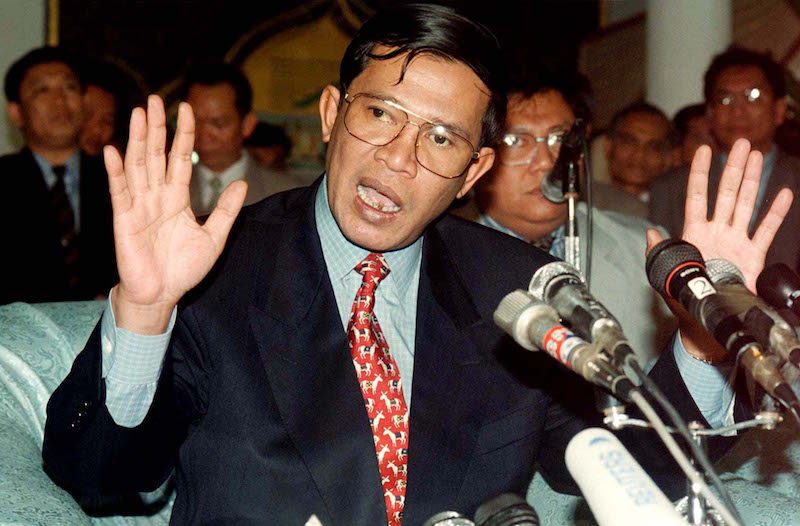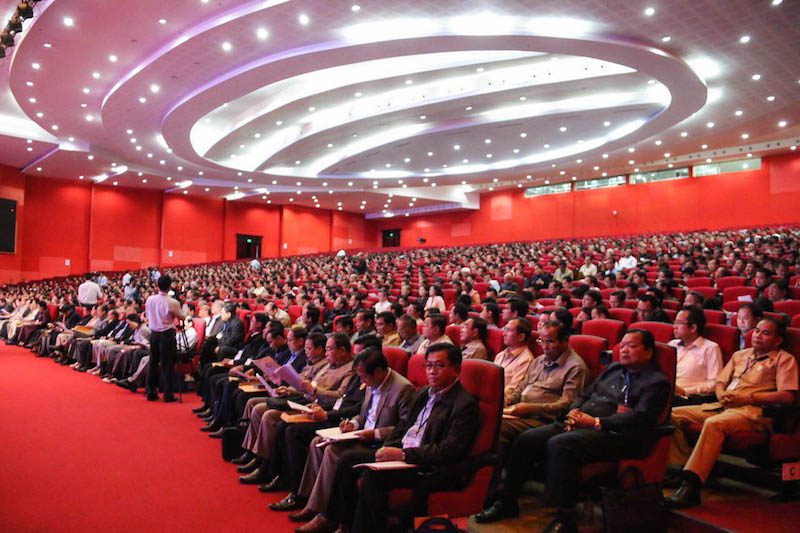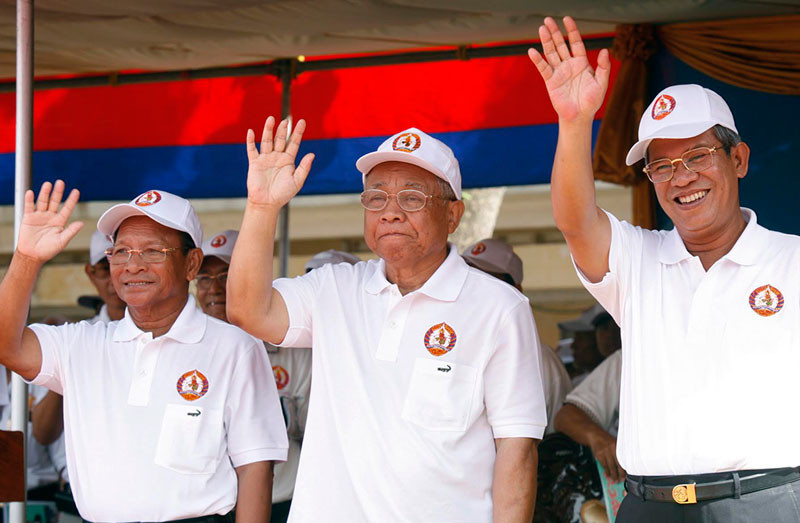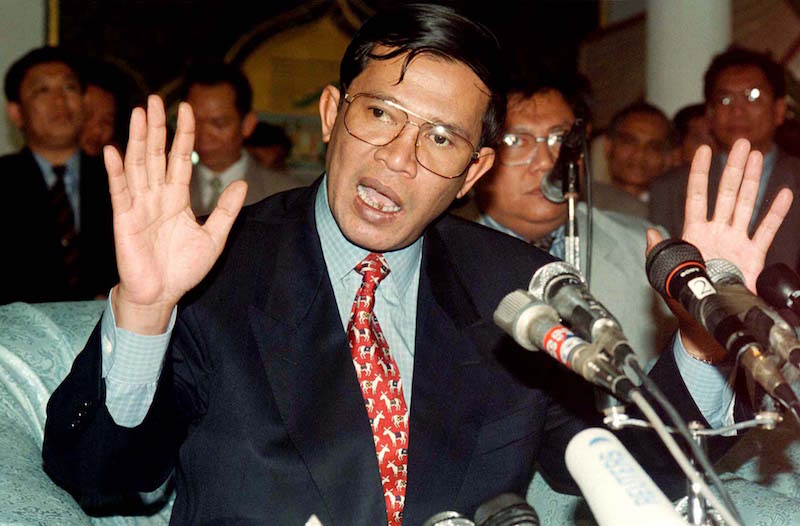He makes all the big decisions, has friends and family in all the right places, and personally controls armed forces larger than Senegal’s national army. Supplicants and diplomats alike refer to him as Samdech—or “The Greatest.”
Such is the portrait painted by Australian political scientist Lee Morgenbesser, who argues in a new paper that Prime Minister Hun Sen runs a “personalist dictatorship” and has nearly unassailable control over the Cambodian state and ruling party.

In “Misclassification on the Mekong: The Origins of Hun Sen’s Personalist Dictatorship,” published on Tuesday on the journal Democratization’s website, Mr. Morgenbesser contends that Mr. Hun Sen has slowly co-opted the ruling coalition that initially gave him authority.
“The overall picture to emerge is of an authoritarian regime characterized by Hun Sen’s personal control of the political system (including members of the ruling coalition),” he writes.
Mr. Morgenbesser, a research fellow at Australia’s Griffith University, says that past pundits have mistaken the state for a limited multiparty government, “electoral autocracy” or civilian dictatorship.
Instead, the paper asserts, Mr. Hun Sen has used his more than three decades in power to steadily nudge the state from single-party rule to a “party-personalist regime” in which the CPP serves as an election-time vehicle for votes and legal legitimacy.
Mr. Hun Sen’s political career effectively began in a Vietnamese prison, when the defected Khmer Rouge commander charmed his minders and was plucked to lead the successful invasion of his country. In 1985, Mr. Hun Sen was chosen by the Vietnamese for the role of prime minister for the government it had installed six years earlier.
Beset by external enemies and feuding elements of his own party, Mr. Hun Sen’s path to power was hardly assured.
“At the February 1997 [CPP] party congress, for example, Hun Sen’s selfishness and outspokenness was openly criticized by senior party and military officials, who urged him to work more with the party ahead of commune and national elections,” according to Mr. Morgenbesser.
The academic contends that the young leader turned to “neopatrimonialism”—dishing out patronage to keep elites and voters happy—and repression to halt the rise of rivals and rabble-rousers. The arrangement helped reduce the risk of a coup by stocking key positions with well-paid loyalists who have little incentive to shake the status quo.
The aftermath of the 2003 national election exemplified Mr. Hun Sen’s habit of mixing aggression and appeasement.
When now-deceased CPP President Chea Sim opposed a 2004 coalition deal with Prince Norodom Ranariddh in the aftermath of contested election results, Mr. Hun Sen had riot police, commanded by his ally and National Police Commander Hok Lundy, “surround Chea Sim’s residence, escort him to the airport and put him on a plane to Thailand.”
The deal with the royalist Funcinpec party drew from a well-worn page of Mr. Hun Sen’s playbook, the academic says, with the prime minister overseeing the appointment of several hundred party officials into lucrative senior positions that effectively neutered his rival party in later elections.
In the case of his own party, Mr. Hun Sen often responded to rivals by expanding key party organs and stuffing them with his allies, he says.
The CPP’s executive committee has swollen from 45 to 545 members during Mr. Hun Sen’s rule, with loyalists overwhelming factions formerly allied with Chea Sim. The party’s standing committee has also more than tripled in size, stocked with heads of security apparatuses often accused of the regime’s worst abuses, the paper says.
Meanwhile, Mr. Hun Sen consolidated his control over key units of the armed forces.
Following an alleged coup attempt in 1994, for example, Mr. Hun Sen reorganized what was a small security detail into groups of specialized, loyalist forces that included his Bodyguard Unit, Brigade 70, and National Counterterrorism Special Forces, now led by his son Hun Manet.

“Ultimately, the most definitive marker of how Hun Sen has personalized power is the wanton transformation of his security detail, which numbered around 60 bodyguards in the mid-1990s, into a paramilitary architecture equivalent in size to the national militaries of Senegal, Somalia, or Zambia,” Mr. Morgenbesser writes.
The strength of those forces allowed Mr. Hun Sen to override the objections of CPP factional foes Chea Sim and Interior Minister Sar Kheng, as well as Defense Minister Tea Banh, to bring together forces to fight against Prince Ranariddh and the Funcinpec party in 1997, according to Mr. Morgenbesser.
The prime minister’s family ties are another key source of personal power, the paper says.
“It constitutes a sprawling network consummated by a web of politically auspicious marriages” rooted in the upper echelons of the CPP, military, police and the business world. Especially notable are the premier’s well-placed sons, who Mr. Morgenbesser says are being primed to replace their father—“a rare event for personalist dictators,” he notes in the paper.
Leadership change is generally a challenge in such regimes because they are organized around a single individual, he explains.
“Personalist dictators such as Hun Sen are far more likely to end up being killed, jailed, or exiled than the leaders of strictly military or party regimes, regardless of whether regime change occurs,” he says.
However, Mr. Morgenbesser wrote in an email on Thursday that in Cambodia’s case, Mr. Hun Sen appeared to have established a strong enough coalition to make succession feasible.
“Hun Sen cannot be threatened via a coup. This makes the task of succession far smoother because the incumbent business, military and political elites stand to still gain from his successor,” he said.
“The more immediate concern in the Cambodian context is not whether to undertake a succession, but when to do so. …Immediately after winning the 2018 national election offers an ideal window of opportunity.”

left, and Prime Minister Hun Sen during an election rally in Phnom Penh in June 2008. (Reuters)
Coming elections will be a critical moment for the prime minister, whom Mr. Morgenbesser says still relies on the CPP’s patronage networks to deliver projects and goods that garner votes that, in turn, provide the prime minister with legitimacy.
“The moment the CNRP is dissolved, however, the validity of Hun Sen’s claim to be popular will become somewhat ludicrous because it cannot be verified in any meaningful way,” Mr. Morgenbesser said in the email, referring to new legislation that would allow the courts to dissolve political parties.
CPP spokesman Sok Eysan on Thursday dismissed the paper, saying that only Mr. Hun Sen’s opponents stoop to calling the prime minister a dictator.
“Ordinary people do not call him dictator,” he said.
“When it comes to political issues, he is at the top and without challengers, but the platform of the CPP does not come from him alone. It comes from the permanent committee of the party, and the permanent committee takes its platform from the congress of the whole party across the country.”
Sophal Ear, an associate professor of diplomacy and world affairs at Occidental College in Los Angeles, assessed the paper before publication and said its findings rang true.
“I don’t think anyone can dispute the personalist nature of Cambodian politics,” he wrote in an email on Thursday. “Yes, there are factions in the ruling party, but the argument is always that one man, and one man alone, holds them together.”
“Vietnam and China figured out long ago that there needed to be regular changes in leadership…but, obviously, not every Politburo got the memo,” he added.
(Additional reporting by Khuon Narim)




